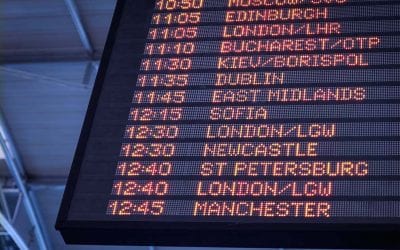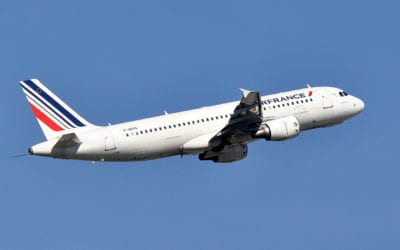Why airlines are clamoring for another no-fly list. America doesn’t need it.
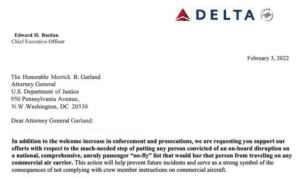
The letter sent to DOJ by the CEO of Delta Air Lines
In a letter first reported by Reuters and first published in full by The Points Guy, CEO Edward Bastian of Delta Air Lines has called on Attorney General Merrick Garland to “support our efforts with respect to… putting any person convicted of an onboard disruption on a national, comprehensive,… ‘no-fly’ list that would bar that person from traveling on any commercial air carrier.”
The latest letter from Delta steps up a lobbying campaign the airline began last fall, which remains as misguided as ever. The letter highlights the urgent need for Congress to enact the Freedom to Travel Act (H.R. 6030). It would make clear the rights of travelers, the duties of airlines, and other common carriers. Plus, a new law will limit when, by what authority, on what grounds, and according to what procedures the right to travel can be restricted.
Airlines and flight attendants are asking for a no-fly list for unruly passengers.
As Jay Stanley of the ACLU has noted, Delta has not said according to what criteria or procedures it thinks Federal authorities should bar individuals from travel by air. But on its face, the letter seems to suggest that any conviction for “an onboard disruption” should result in an automatic (and irrevocable?) prohibition on air travel of unspecified (lifetime?) duration.
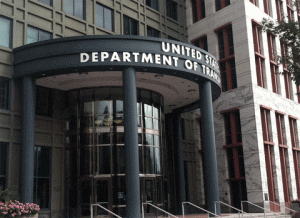
The reference in the letter from Delta to “conviction,” a term applicable only to criminal offenses, suggests that Delta proposes that an air travel ban be imposed as a sanction for certain crimes. A ban on air travel is not a possible penalty. The loss of travel is not mandatory for violation of any statute we can find. Only Congress, not the Attorney General, could enact a law adding such a sanction to the U.S. Code — even if such a law could withstand the inevitable Constitutional challenges, which we doubt it would.
There is no DOT judicial process or a law against being “unruly” (whatever that is).
Judges can impose special conditions of probation or parole as part of their sentences on those convicted of crimes. But in the absence of a statutorily mandatory sentence, those conditions must be individually justified. Justice cannot be automatic. Special conditions of probation or parole that restrict the exercise of fundamental rights must be in place. The right to travel is fundamental. Its elimination requires a solid, particularized justification.
It’s essential to keep in mind just how draconian the consequences of an air travel ban might be. There are no regular passenger ferries or ocean liners between the mainland U.S., Hawaii, Puerto Rico, the U.S. Virgin Islands, Guam, or American Samoa. An air travel ban could amount to exile from the mainland and confinement to any of those islands, perhaps for life. It may mean a lifetime banishment from, and inability to return to, one’s native island. U.S. citizens placed on no-fly blocklists while abroad have been prevented from returning home. Overstaying one’s visa means American citizens may end up in foreign prisons.
The American government has a long way to go. It must create a judicial rule to enforce another no-fly list.
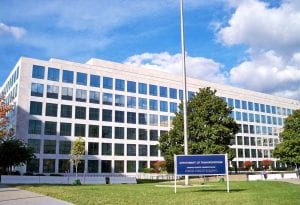
FAA Headquarters Building
Delta’s proposal appears to be limited to people convicted of certain crimes. But it has been taken up by others who want an even more extensive travel blacklist imposed by fiat. American travelers need the rule of law.
In response to questions about the Delta Air Lines proposal, Secretary of Transportation Pete Buttigieg told CNN, “I think we need to take a look at it.” He rambled on, “Look. The airlines are often making their internal no-fly list. Some of them have spoken about maybe coordinating on that. At DOT, we are looking at these policy recommendations as well.” However, the Department of Transportation’s duty is to enforce the Federal laws and international aviation and human rights treaties that recognize the right to travel by common carrier.
The DOT should not support, encourage, or tolerate vigilante actions by airlines. Airlines can, and should, report suspected crimes to the police — and then let the police deal with them. Airlines are not police and have no judicial authority or competence whatsoever.
The laws against “unruly passengers” are fuzzy and ill-defined at best.
In an editorial today, the Washington Post claims, “The federal government is empowered to ban known threats to safety on the airways. It already does so in the case of suspected terrorists.” The problem is that, while the Federal government does have that power, it has never chosen to use it. Instead, it has acted in flagrant disregard for the Constitution and the rule of law.
The branch of the Federal government with the power to ban people from the airways is the Federal judiciary. The Department of Justice (DOJ) could petition Federal courts to issue no-fly injunctions. Federal judges could issue them. But, they must be subject to well-established substantive judicial actions.
A twisted jumble of federal organizations from DOT to TSA and the DHS to the FAA may be responsible. But, how do we work our way to due process?
The proper role of agencies charged with “maintaining” no-fly lists is to keep accurate records of who has been lawfully barred from airline travel by valid court orders.
So far as we can tell, though, the DOJ has never once prosecuted a no-fly order. Nor have they attempted to use any existing structure of laws and legal procedures.
Instead, the rules come from a rat’s nest of agencies, including the DOJ, Homeland Security, and other agencies. An inter-agency Watchlisting Advisory Council has conspired to violate the rights of U.S. citizens, residents, and visitors alike. Many are blacklisted without bothering to get courts to even rubber-stamp no-fly orders.
We need to withdraw from this quagmire of injustice, Don’t march further into the mud. Congress needs to make the law clear to Federal courts for that to happen. Federal agencies, airlines, and other common carriers need the Freedom to Travel Act. And that will take time and debate.

READ ALSO:
Crystal Cruise bankruptcy is real — file for a refund now! They’ll never sail again!
Travel agent tips for a vacation world that MAY be opening for travelers
The winner of a 2003 Lowell Thomas Travel Journalism award for investigative reporting from the Society of American Travel Writers Foundation for his in-depth reporting on the privacy of travel records, Hasbrouck protects the freedom to travel, the privacy of travelers, and their right to control how personal travel records are used by travel companies and government agencies.


